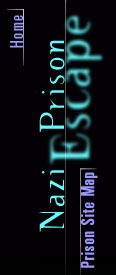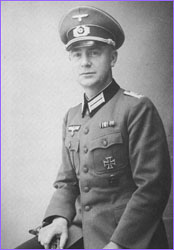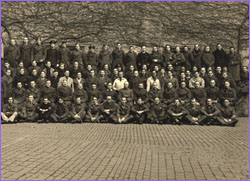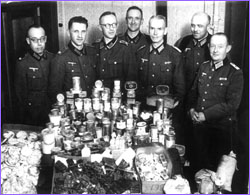 |
 |
|  Reinhold Eggers
Reinhold Eggers
|
The Jailor's Story
by Reinhold Eggers
Reinhold Eggers, who was promoted from duty officer to chief of security at
Colditz Castle in 1944, served on the prison's staff for longer than anyone
else, from November 1940 until the end of the war in April 1945. His tenure,
along with his ability to speak English and French, "gave me as good a chance
as anyone on the German staff of knowing what was going on," he wrote in the
preface to his book Colditz: The German Side of the Story (Norton,
1961). "How little this sometimes was will become evident from this story."
In his book, which we excerpt here with permission, Eggers chronicled dozens of
escape attempts in an admiring, almost tongue-in-cheek manner. Far from the
stereotype of the harsh, heel-clicking Nazi officer, Eggers comes across as an
avuncular, highly likeable fellow, like a schoolteacher who is more amused than
angered by his charges. (In fact, he was a schoolteacher before the war.) Here,
read about how Eggers felt about his job, his inmates, and their courageous
antics, including one rather famous escape attempt involving a piece of
apparently levitating turf. As you read, feel free to orient yourself using
our map of Colditz.
Masters of escape
My records show that more than 300 would-be escapers were caught in the act, often
the same people trying again and again. On 130 occasions escapers actually got
out of the castle or got away when in transit locally. The number who got clear
away over the frontier and were never taken was 30, breaking down into six
Dutch, 14 French, nine British, and one Polish, as near as I can remember. I
was not in complete charge of security until 1944, but until then had, of
course, to contribute what I knew or could find out or could work out, to our
camp security office.
 Many prisoners got out
of the castle, but only 30 managed to get away for good.
Many prisoners got out
of the castle, but only 30 managed to get away for good.
|
|
We held security conferences whenever an escape took place and at least every
week as a matter of routine. Practically every routine occasion was an escape
occasion, and one way and another every escape was an occasion in itself. In
fact, I claim some honor for having been part of a team, a very amateur team I
admit, of a German "holding" force whose clumsy efforts were nonetheless so
successful that the experts had to lay on absolute masterpieces of escape to
beat us.
The stage for this battle between the two security teams, German and Allied,
was in some way set to the advantage of the prisoners. The POWs were, first of
all, experienced in the job. In addition, our hands were somewhat tied by our
not very practical superiors at Army Command HQ in Dresden and, above them, in
Berlin. We made things better for the prisoners by cramming Colditz with new
escape materials week after week. Each new arrival brought with him knowledge
of new methods of escape, acquaintance with fresh routes, knowledge of extra
documents required, checks likely to be made at railway junctions and on
trains, and so on. In this castle, the prisoners had the interior lines of
communication and the initiative as well. Our effectives, real effectives, were
hardly a dozen, while their team ran into hundreds.
|  Each would-be escaper had dozens of potential accomplices at his disposal.
Each would-be escaper had dozens of potential accomplices at his disposal.
|
Guarding against success
In Colditz it was true to say that there was never a dull moment. As time went on,
we could see the pattern, and it was one that we had imposed upon us, whereas
it was we who should have been the ones to call the tune rather than follow it.
The prisoners and we were engaged in an unending game of leapfrog. First we
were ahead with our security barriers, then they were, scheming successfully
round them. Everything the POWs did or said or thought was planned to give them
an advantage, an advantage either immediate or several jumps ahead.
If, as a result of an escape or an attempt to escape, we altered our
arrangements or introduced some new plan, they would catch on quicker than our
own people who had, after all, other things to think about than their hours of
duty up at the castle. Most of the prisoners were "on duty" the whole time;
they had no other life.
Another major security difficulty concerned our regular camp staff,
particularly NCOs [noncomissioned officers]. The longer these stayed in the
castle, the better they got to know the prisoners and their methods. But they
became all the more subject to bribery with cigarettes, chocolate, or coffee,
and to the softening effect of familiarity and simple politeness between
themselves and the prisoners. Another weakness was the disadvantage that the
German lower rank feels in dealing with officers, of whatever nationality. And
if we replaced these NCOs, it took new arrivals months to learn the tricks of
the trade, during which time the prisoners took full advantage of their
ignorance.
 German guards pose with
some of the contraband smuggled into Colditz.
German guards pose with
some of the contraband smuggled into Colditz.
|
|
All our NCOs at Colditz had nicknames, knew it, and were rather amused by it.
There was Cheese—he was a little man, what we call "three cheeses high"
(Dreikäsehoch); the Policeman; Hiawatha, who rather fancied himself
until he discovered that his mate was known as Minnehaha; Big Bum; Auntie, the
Quartermaster—he was in Colditz right to the end; Fouine (the French word
for ferret)—known to the English as Dixon Hawke, very clever at smelling out
tunnels; and Mussolini, our staff sergeant in charge of the orderlies, an old
soldier from the first war who disliked all officers, even his own!
These men, and, of course, the general mass of the guards, could not fail to be
impressed by the active life of the castle, and more so by the tricks the
prisoners got up to, but most of all by the escape success they managed to
register. All this reflected on us, their own officers, who were shown up as
that much incompetent and helpless.
Continue: Escape from the canteen
Escaping Colditz |
The Jailor's Story |
Great Escapes |
The Colditz Glider
Resources |
Transcript |
Site Map |
Nazi Prison Escape Home
Editor's Picks |
Previous Sites |
Join Us/E-mail |
TV/Web Schedule
About NOVA |
Teachers |
Site Map |
Shop |
Jobs |
Search |
To print
PBS Online |
NOVA Online |
WGBH
© | Updated January 2001
|
|
|